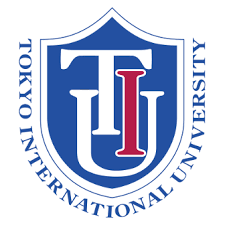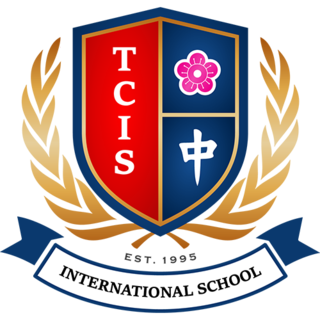
The Kansai region or the Kinki region lies in the southern-central region of Japan's main island Honshū. The region includes the prefectures of Nara, Wakayama, Kyoto, Osaka, Hyōgo and Shiga, often also Mie, sometimes Fukui, Tokushima and Tottori. The metropolitan region of Osaka, Kobe and Kyoto is the second-most populated in Japan after the Greater Tokyo Area.

Taipei American School is a non-profit private international school with an American-based curriculum located in Tianmu, Shilin District, Taipei, Taiwan. TAS serves students from pre-kindergarten through grade 12. At the high school, students may choose from a range of courses including honors, AP, and IB courses that fulfill the full IB Diploma Program.

North Jakarta Intercultural School (NJIS), formerly North Jakarta International School, is a private international school in Kelapa Gading, Jakarta, Indonesia. The school is an Internation Baccalaureate Continuum international school with an American orientation.

Ritsumeikan Asia Pacific University, commonly referred to as APU, is a university in Japan. Ritsumeikan APU was established in April 2000 in Beppu, Ōita, Japan. APU was created through the collaboration of three parties from the public and private sectors: Ōita Prefecture, Beppu City and the Ritsumeikan Trust.

Nishimachi International School (西町インターナショナルスクール), established in 1949, is an international school located in the Azabu area of Tokyo, Japan. Co-educational, non-sectarian, private K-9 day school. The main language of instruction is in English. Japanese is taught to all students every day from beginner to native speaker level.

Sophia University, is a private research university in Tokyo, Japan. Founded in 1913, Sophia is one of the three Sōkeijōchi (早慶上智) universities, a prestigious grouping which consists of the top three private universities in Japan alongside Keio University and Waseda University. Founded by the Jesuits, the university is affiliated with the Catholic Church. As of 2023, the University has 12,080 undergraduate students and 1,357 postgraduate students. The university has 9 undergraduate faculties and 10 graduate schools, with over 13,900 students in total. Sophia University has consistently ranked as the top Catholic university in Asia.

The United Nations International School of Hanoi is an international school in Hanoi, Vietnam. It is a private, non-profit organization founded in 1988 with the support of the United Nations Development Programme in Vietnam (UNDP) with the aim of providing an education to the children of UN staff and others.
The East Asia Regional Council of Schools (EARCOS) is an organization of 158 member schools in East Asia. These schools have a total of more than 132,000 pre-K to 12th grade students. EARCOS also has 170 associate members, including textbook and software publishers and distributors, universities, financial planners, architectural firms, insurance companies, youth organizations. It has over 35 individual members.

Tokyo International University (TIU) (東京国際大学, Tōkyō Kokusai Daigaku) is a private, research-oriented liberal arts university and is one of the most international institutions of higher learning in Japan. Founded in 1965, with a focus on business and commerce, the college grew into a private university accredited by the Ministry of Education (MEXT) that now encompasses six undergraduate schools and four graduate schools in the Greater Tokyo Area. TIU also has a sister school relationship with Willamette University (WU), as well as an American campus adjacent to WU's campus (Tokyo International University of America, TIUA) in Salem, Oregon.
The British School New Delhi is an independent, multicultural, English Medium, co-educational international school. This not-for-profit school offers the National Curriculum of England adapted to an international context, the EYFS programme, the IGCSE and the IB Diploma Programme. With over 1,200 students from 66 nationalities, the school provides student-centred education in a safe, stimulating and multicultural environment.

Nagasaki University is a national university of Japan. Its nickname is Chōdai (長大). The main campus is located in Bunkyo-machi, Nagasaki City, Nagasaki Prefecture, Japan.

Cebu International School (CIS), was founded as the Cebu American School in 1924, and renamed in 1973. It is a co-educational day school, non-profit, non-sectarian institution, governed by a ten-member Board of Trustees. The current legal status of the school is defined in Republic Act No. 9190 (2003). English is the language of instruction at CIS.

The International School Yangon is a private, co-educational day school, which offers an educational program from Pre-Kindergarten through Grade 12 for students of all nationalities who desire a U.S. education. The school was founded in 1955 and is widely considered to be the most prestigious secondary school in Myanmar due to its selectivity, academic rigor, breadth of on-campus facilities, and distinguished alumni. The school year typically begins the second week of August and ends the first week of June.

Founded in 1994, Western Academy of Beijing is an international school located in Beijing. The school provides education from early years 3 to grade 12. WAB uses the IB PYP until Grade 5, IB MYP up to and including grade 10, and the IB DP for grades 11 and 12.
International School of the Sacred Heart (ISSH) is a Kindergarten (co-ed) – Grades 1–12 (all girls) school in Shibuya, Tokyo, Japan, founded in 1908. As part of the Network of Sacred Heart Schools it is affiliated with schools and institutions in 44 countries. The International School of the Sacred Heart (ISSH) is a multicultural Catholic school. Kindergarten classes for 3, 4 and 5 year olds are for boys and girls, while grades 1–12 are for girls only. ISSH is located in the Hiroo neighborhood and was founded in 1908, belonging to a worldwide network of the Schools of the Sacred Heart.

Temple University, Japan Campus is an international campus of Temple University. TUJ is located in Setagaya-ku, Tokyo and Kita-ku, Osaka, Japan. It is the oldest and largest foreign university in Japan, with approximately 1,840 matriculated undergraduate students, of which approximately 60% come from more than 67 countries around the world.
Osaka International School of Kwansei Gakuin is a co-educational international school, located in Minoh, Osaka Prefecture, Japan. OIS educates students from kindergarten through to grade 12. OIS is accredited by the Western Association of Schools and Colleges and is offers three International Baccalaureate (IB) programs: Primary Years Programme (PYP), Middle Years Programme (MYP), and Diploma Programme (DP).

Thai-Chinese International School is a private, non-profit day school in Bang Phli District, Samut Prakan Province, in the Bangkok Metropolitan Region of Thailand.
International School of Dongguan is an international school in Nancheng District, Dongguan, Guangdong, China. It serves levels Pre-Kindergarten through grade 12.













